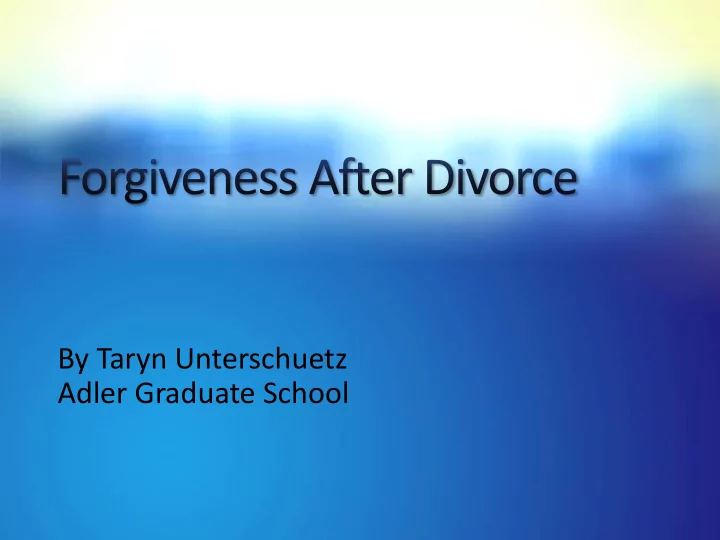

By Taryn Unterschuetz Adler Graduate School
Marriage and Divorce What is Forgiveness Forgiveness during Marriage Boundary development Divorce Forgiveness after divorce Adjustment of boundaries after divorce Effect of forgiveness on boundaries Striving for superiority Giving permission Healthy and happy marriages and divorces
In 1993, a study was completed by Baker and Emery that reviewed couples that had recently applied for a marriage license and expectations on divorce. Zero percent of the couples expected they would get divorced even though they estimated that 50% of couples become divorced. Marital Putting in the Damage Satisfaction Work Moving forward Boundaries Forgiveness
Feeling empathy- promotes forgiveness Willingness to forgive- people are more likely to forgive when they can gain.
What comes to mind with the word “divorce”? Its not usually positive comments or happiness and butterflies. Its usually anger, fighting, resentment and then more anger, sadness, fear… Judge Michelle Lowrence- The fear of not knowing and leaving the often predictability of marriage Judge Michelle Lowrence- The author of The Good Karma Divorce -
Reported reasons of divorce: Infidelity Incompatibility Alcohol/Drug abuse (Kanewischer & Harris, 2005) Growing apart Lack of communication Money problems Personal problems with spouse Not getting enough attention (Hawkins et. al, 2012)
Hawkins, Willoughby, and Doherty (2012) found that in about 75% of divorced couples, at least one partner had regrets about the divorce.
Phases of forgiveness: Identifying the hurt and feeling remorse Confessing and confronting The dialogue to understanding To forgive and make reparation To let go and forget (Coleman, 1989)
Forgiveness is not about just saying “I forgive you”, forgiveness is about taking reflection on the situation and ourselves. Forgiveness can be described as making the “decision not to punish the person(s) who have wronged you, taking action on that decision, and experiencing the emotional relief that follows” (Gustafson Affintino, 2007, page 4).
When we hang on to resentments and anger they become a rock in our hearts and soul that we carry daily. Hanging on to resentments has also been known to create ulcers, increase anxiety, and increase blood pressure (Lowrance, 2010).
When we ask for forgiveness and it is denied Denied forgiveness- what does that mean in the process of divorce or marriage
2015 2010 2005 2000 0 500,000 1,000,000 1,500,000 2,000,000 2,500,000 Divorce Marriage https://www.cdc.gov/nchs/data/dvs/national_marriage_divorce_rates_00-15.pdf
Physical boundaries- change often very quickly Emotional boundaries can take years to change Emery and Dillon (1994) explain that “boundaries are difficult to renegotiate following a marital separation, however, because of uncertain normative expectations, intense and painful emotions, incompatible desires, limited contact, and communication, and loyalty dilemmas (p. 374).
“Perhaps not surprisingly, spouses report that the capacity to seek and grant forgiveness is one of the most important factors contributing to marital longevity and marital satisfaction.” (Fenell, 1993, as cited in Fincham, Palerari, and Regalia, 2002, p.27)
Research suggests that it takes about 2 years to adjust to a divorce. (Peterson and Hendrickson Christensen, 2002)
The more blame attributed to the ex-partner and the more severe the blame, the less forgiveness. (Rohde-Brown and Rudestam, 2011)
As stated by Ramisch, McVicker, & Sahin (2009) couples that are divorcing are clarifying “new boundaries by shifting role definitions and expectations from what it means to be a married couple to what it means to be a formerly married couple (Cole & Cole, 1999, p. 271)” (p. 483). The process of divorce undoubtedly changes boundaries, but learning forgiveness and going through the process of forgiveness will provide a positive adjustment in boundaries.
Divorce is an ambiguous loss that results in unknown familial roles (Peterson and Hendrickson Christensen ,2002) Learning new boundaries, accepting them and adjusting to them
Coleman (1989) states “you always run the risk of resenting those people who expose your weaknesses” (p. 160). Yarnoz- Yaben (2013) explains it very well that too much forgiveness can be damaging in that the one forgiving loses self- respect and self- concept clarity. Self concept and Adler- one of the five life tasks
Striving for superiority is a concept by Alfred Adler meaning going from a perceived minus situation to a perceived plus (Mosak & Maniacci, 1999). Striving for superiority can get in the way of a healthy divorce and the process of forgiveness. Be mindful of social interest and not winning at the cost of another
Give permission to feel Give permission to act civil Give permission to forgive
Why do couples report staying married:Previti and Amato (2003) (p. 570). Love Respect Friendship Good communication- “we talk to each other before anything becomes a problem” (p. 566). If problems don’t get resolved they can just get bigger and bigger, so by couples communicating and forgiving before they end up in divorce court, couples can avoid hurting one another even more and stop the cycle. Even though some couples problems lead them to divorces, they can still have respect, friendship, and good communication and some level of love through forgiveness.
Recommend
More recommend